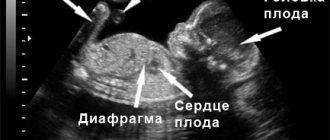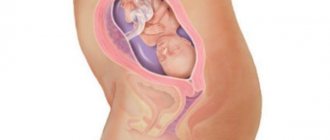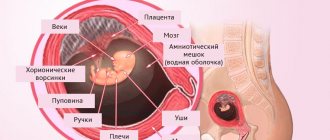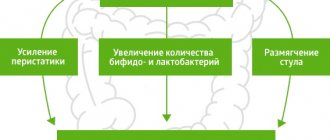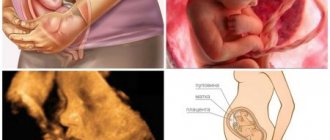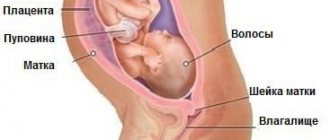Despite the presence of toxicosis, expectant mothers are in high spirits, everything is new for them, and emotions are in full swing. You are certainly no exception.
During this period, you need to pay special attention to your health, try to avoid large gatherings of people, protect yourself from various infections and colds.
A balanced diet and hardening will support the immune system. At the slightest sign of a cold, consult a doctor, do not self-medicate!
In general, take care of yourself, enjoy life and enjoy your new condition!
Fetal development
At the eighth week, your baby already has not only lips, but also a tongue, and baby teeth are also formed. During this period, the stomach, esophagus, abdominal cavity, and intestines are formed.
The heart continues its formation, the cardiac division into chambers is almost completed, it is fully functioning. One-way blood flow through the heart is established. The rudimentary circulatory system begins its work.
This is what your baby looks like at 8 weeks
The feet and hands are shaped. An ultrasound will show your baby's first movements. The brain, cortex and gyri are developing; with the help of special equipment, its activity can be recorded.
By this period, your baby has already decided on his gender. Eyelids form on the eyes, and the tip of the nose and upper lip become more distinct. In the eighth week of pregnancy, your baby's heart beats twice as fast as yours, up to 130 beats per minute.
Every week the amount of amniotic fluid and the diameter of the fetal sac increase; by the eighth week its diameter averages 30 mm.
Recommendations
At the 8th obstetric week of pregnancy, a woman should give up bad habits and minimize the effect of adverse factors, such as:
- smoking,
- alcohol consumption,
- stress at work or at home,
- taking medications without a doctor's prescription,
- undergoing an x-ray examination,
- contacts with sick people,
The expectant mother needs to take care of her health, if possible, spend at least 1 hour in the fresh air, ventilate the room at least 2 times a day, and do not deny herself daytime sleep if the body requires it.
Vitamins
A pregnant woman’s body needs vitamins and minerals now more than ever, because some of them go to the baby. At the 8th week of pregnancy, you should pay attention to folic acid, tocopherol, as well as microelements - magnesium, iodine, iron, phosphorus, potassium. Multivitamin complexes can be taken only after consultation and prescription by a gynecologist.
Recommended vitamins during pregnancy
Nutrition
The expectant mother needs to remember that everything she eats will go to the baby. Therefore, you need to take a responsible approach to creating your own diet. You should eat small portions every 2-3 hours, and avoid starvation.
| must be on the menu | It is recommended to remove it from the menu | should be avoided |
| fresh fruits and vegetables | mushrooms | fast food and carbonated drinks |
| lean types of fish and meat | white cabbage | smoked meats, sausages |
| cereals | beans | pickles |
| dairy | pears | spicy and fried foods |
| eggs | ||
| wholemeal bread |
Physical activity
For a pregnant woman, physical exercise is not only not contraindicated, but also recommended. To avoid the risk of harming the unborn child, active training and professional sports should be replaced by yoga, fitness for pregnant women, exercise balls, and a swimming pool.
A pregnant woman should not experience physical overload and fatigue.
It is best to work with a trainer who will create an optimal set of exercises to maintain the health of the mother and without harm to the baby.
Exercising helps:
- eliminate lower back pain,
- normalize intestinal function,
- get rid of stress,
- Gain less weight and make pregnancy and childbirth easier.
Intimate life
If there are no contraindications from a doctor, the pregnant woman can continue to be sexually active. In some conditions (multiple pregnancy, threat of miscarriage), it is better to abstain from intimate life at 8 weeks of pregnancy. The period up to 12 weeks is considered very unpredictable, so it is better not to risk it and wait it out.
For an expectant mother at 8 weeks of pregnancy, there is a main rule - do no harm.
It is important for a pregnant woman to learn to think for two when making any decisions regarding her body. It may not be visible yet, but life inside is actively developing and it is the mother who bears the lion's share of responsibility for the health of the unborn child.
Ultrasound at 8 weeks of pregnancy
As mentioned above, on ultrasound you can notice the first movements of the fetus. See the contraction of the heart and determine the heartbeat. Determine the size of the uterus.
The gonads of the embryo are visible, the tip of the nose becomes visible, the eyes are still closed.
At the moment, the embryo is growing by 1 mm every day, and with a daily ultrasound examination you might notice this.
Ultrasound of the uterus notes relaxation of the vessels of the uterus, acceleration of blood flow through them, which significantly improves the nutrition of the muscle layer and its increase.
Ultrasound examination is performed both transvaginally and transabdominally.
At this time, ultrasound is performed according to indications.
Mom's belly
The size of the fetus increases in the 8th week of pregnancy, therefore the uterus also increases. At this stage, it becomes the diameter of a small lemon, while the belly becomes larger on average by 3-5 cm. Since at 7-8 weeks of pregnancy the size of the fetus has increased significantly, others begin to notice the “interesting position” of the woman.
Due to the constant stretching of the uterus, her stomach may hurt. This is normal for the first trimester of pregnancy. Painful symptoms occur due to stretching of the ligaments that connect the bones. Unpleasant sensations most often appear on the right side, since the embryo stretches the uterus in this direction. To alleviate the condition, a woman will benefit from a warm bath and a lying position on her side. If the pain is severe, increasing, or sharp, you should immediately consult a doctor.
What happens in your body at 8 weeks?
The breasts enlarge, the glands whose task is to produce milk begin to grow, this happens under the influence of prolactin. The size of the uterus within the pelvis also increases. The cervix begins to soften, this process will occur throughout pregnancy, thus preparing for childbirth. The hormonal production of the corpus luteum is in decline, this function is taken over by the developing placenta, and your baby is already nourished by the uterus.
Your uterus has grown to the size of a grapefruit, and it is its growth that provokes frequent trips to the toilet.
Hormonal changes
Pregnancy at 8 weeks is influenced by estrogen, progesterone and prolactin. The concentration of hormones increases several times, as they preserve and support pregnancy, and also prepare the woman’s circulatory system for an increase in the amount of blood. Therefore, her main arteries increase in volume.
The corpus luteum begins to produce the hormone relaxin, which relaxes the muscles of the cervix and the ligaments of the uterus. This is due to the constantly growing size of the fetus at 8 weeks of pregnancy. The concentration of relaxin increases every month and by the time of birth reaches a maximum for normal divergence of the pelvic bones.
How you feel at 8 weeks
During the eighth week of pregnancy, your body continues to make changes. Regular mood swings are your constant companion; now you feel joy, but after a while feelings of fear and anxiety may appear. This is normal, don’t dwell on it, just live and enjoy the upcoming birth of your baby.
There is morning nausea and vomiting, dizziness. You may feel bloating; this occurs under the influence of progesterone; the smooth muscles of the intestinal loops expand and relax.
Difficulties in pregnancy
During the 8th week of pregnancy, some problems may arise. The main ones include:
- Toxicosis. At this time, it should be moderate, as it can lead to dehydration of the woman’s body.
- Miscarriage. At 8 weeks there is a risk of spontaneous abortion. This can happen due to increased tone of the uterus, low viability of the embryo, rejection by the mother’s body as a foreign body, severe stress, trauma, or hormonal imbalances. It is necessary to urgently consult a doctor if you have acute nagging pain in the abdomen and lower back, as well as the appearance of bloody discharge.
- Placental abruption. The pathology is accompanied by bleeding and sharp, nagging pain in the abdomen and back. In this case, it is possible to save the child’s life if you consult a doctor in time.
- Non-developing pregnancy. In the first trimester, the likelihood of developing pathology is much higher than in others. Freezing of the fetus leads to its death and further miscarriage. The causes of the pathology are: infectious diseases, blood clotting disorders, bad habits, stress, taking medications, heavy physical activity. Symptoms of a non-developing pregnancy: decreased levels of the hCG hormone, pain in the lower back and abdomen, chills, elevated body temperature, and the appearance of spotting.
- Ectopic pregnancy. In this case, the attachment and development of the embryo occurs outside the uterus. This can occur in the abdominal cavity, on the ovaries, or in the fallopian tubes. An ectopic pregnancy poses a serious threat to a woman's health and life because it ruptures the organ in which it grows. The pathology is diagnosed by a blood test for hCG. The risk group includes women who have previously had an abortion, under 18 and over 35 years of age, with abnormalities in the structure of the uterus and fallopian tubes.
- Rubella and toxoplasmosis. These infectious diseases are dangerous both during primary infection and during pregnancy. They are indications for abortion because they lead to abnormalities in the development of the embryo. To reduce the risk of infection, it is necessary to get vaccinated six months before planning a pregnancy.
So, at this stage, a woman’s belly becomes a little noticeable. This occurs due to an increase in the size of the fetus. At 8 weeks of pregnancy, the embryo can be compared to a hazelnut. He is actively developing, but still bears little resemblance to a person. During this period, a woman may be bothered by toxicosis, discomfort in the abdomen, heartburn, and slightly elevated temperature. If a pregnant woman has not yet registered, now is the time to do so.
Photos of bellies at 8 weeks
Analyzes and examinations
From the moment a woman registers with the antenatal clinic, she periodically undergoes examinations, takes laboratory tests, and visits a doctor. At 8 weeks, a woman must undergo the following tests:
- urine protein test;
- general blood analysis;
- general smear;
- stool analysis;
- hCG analysis.
The results of laboratory tests will allow the doctor to assess the course of pregnancy, recognize visible deviations and disturbances in the development of the fetus and the health of the woman herself. An elevated level of protein in the urine may indicate a kidney problem.
If necessary, the doctor may prescribe an unscheduled ultrasound examination, which allows:
- Find out the exact place of attachment of the fertilized egg.
- Detect possible obstetric pathologies.
- Assess fetal size and gestational age.
- Recognize multiple pregnancy.
- Confirm the normal course of pregnancy.
Ultrasound examination is performed transvaginally. It is completely safe for the health of the fetus and the pregnant woman.
If necessary or suspected of pathology, a hCG blood test is prescribed, which makes it possible to assess the presence or absence of fetal pathologies with 98% accuracy.
In addition to laboratory and instrumental studies, the doctor listens to the fetal heartbeat every month and measures the abdominal circumference.
Important things for week 8
If your bra is too tight, now is the time to invest in some maternity underwear. The new bra should not be tight, should not pinch the nipple area, and should also be made of soft material. It is better to give preference to models that are equipped with wide straps. It is also advisable to use special underwear for sleeping; in this case, a seamless bra-T-shirt is perfect. It will not only support the breasts, but will also be an excellent prevention for the formation of stretch marks. Such underwear is purchased in specialized stores for expectant mothers.
It's time to say goodbye to the hairpin, and it's not about varicose veins. The fact is that every time you stand on high heels, your uterus changes its position, which in turn does not like the baby. It is much easier to buy ballet shoes and enjoy the comfort. For special and formal occasions, you can allow a stable heel, but not higher than 4 centimeters.
Avoid taking medications, except those recommended by your doctor. You should also avoid exposure to paints, solvents, cleaning products, etc. Forget about hot baths, hot showers and sauna visits. You should not dye your hair or do chemical or permanent hair perms during this period. The danger is not the penetration of chemicals through the skin, but the inhalation of their vapors, therefore, if the desire to look beautiful is not alien to you, it is better to paint your nails and hair in a mask, or in a well-ventilated area, for example, on a balcony.
Sex during this period is not prohibited, but only if there is no threat of termination of pregnancy!
Condition of the expectant mother
Feel
By the 8th week of pregnancy, hormonal levels are still unbalanced. This leads to new sensations in the mother’s body, to which she will now need to adapt. In this case it is observed:
- Chest pain . The mammary gland of the expectant mother is preparing for breastfeeding, the sensations are reminiscent of the state of the breast on the eve of menstruation. The breasts swell, a feeling of heaviness and tolerable pain appear. The sensitivity of the nipples increases, touching them becomes unpleasant. This is a temporary phenomenon and very soon the mammary glands will adapt to the new condition.
- Fatigue . Increased fatigue, drowsiness, fatigue are the eternal companions of a pregnant woman, arising as a result of changes in the hormonal levels of the body. The pregnant woman's relatives will have to get used to frequent mood swings, which is also to blame for the raging hormones in the body of the expectant mother.
- Change of preferences in food and smells . At the 8th week of pregnancy, women's food preferences change and their appetite increases. A previously favorite product may become tasteless or even cause an attack of nausea, but addictions to food that previously caused disgust may appear. Sensitivity to odors increases, so women should avoid rooms with sources of strong odors.
- Frequent urination . This is not common to all women, but it is still a common pregnancy companion. The increasing size of the uterus puts pressure on the bladder, causing a frequent urge to urinate.
- Headache . It may occur due to overwork, which is provoked by hormonal instability and weakening of the mother’s body. To avoid headaches, you should avoid stress and not get nervous over trifles.
- Discomfort in the lower back . The culprit is the growing uterus, which puts pressure on the nerve endings, which, in turn, manifests itself as a diffuse, dull pain in the lower back. In this case, a light massage and moderate physical activity can help. If you experience severe pain, difficulty urinating, or bleeding, you should consult a doctor.
- Edema . The mother’s urinary system now works for two and in some cases the load on it is too great, the fluid does not have time to be removed from the body in a timely manner. All this manifests itself as swelling, which is most often localized on the lower extremities, as well as on the face.
- Change in body temperature . A slight increase in temperature often accompanies pregnancy in the early stages. This is explained by the work of hormones, heat transfer slows down and the temperature rises. A woman may confuse this condition with a cold, so consult your doctor before starting treatment. During a normal pregnancy, the temperature may rise to 37.5.
- Weight gain . With an increase in appetite, the weight of the expectant mother may increase. At week 8, the belly is not yet growing and pregnancy is not visible. If a woman has noticed a weight gain of more than 1 kilogram, then her diet should be adjusted, since excess weight during pregnancy is of no use, it can complicate its course.
Stomach
By this time, the uterus has already doubled in size, but this does not yet affect the size of the abdomen. Painful sensations in the lower abdomen are associated with an increase in the size of the uterus. If the nature of the pain is periodic, without the addition of other signs, then there is no need to worry.
The pregnant belly at 8 weeks does not stand out at all, only the expectant mother can feel the changes. She will want to wear loose clothes; her favorite skinny jeans will suddenly become terribly uncomfortable.
Discharge
During pregnancy, discharge is normally translucent or milky white in color, without a strong odor. If the nature of the discharge has changed, it has become yellow-green or brown mixed with blood or pus, then you should immediately consult a doctor. This may indicate an infectious disease or a threat of miscarriage.
Nutrition at 8 weeks
Refrain from drinking alcohol, reduce the amount of strong tea and coffee, and also avoid plant sweeteners and saccharin.
Nutrition should be balanced and contain all the necessary elements. Since the fetus’s skeletal system and milk teeth begin to actively form, you should start taking calcium-containing medications, and also consume more dairy and fermented milk products.
We continue taking vitamin E and folic acid until the 12th week.
What's happening to the baby
The fetus at the 8th week is still very small, but it already resembles a person. With the help of ultrasound diagnostics, the expectant mother has the opportunity to clearly see his small arms, legs, and head. At this stage, the size of the fetus does not exceed 15-20 mm, and its weight is only 3 - 5 grams. Despite its tiny size, almost all vital organs are actively forming, the rudiments of fingers and toes appear, and internal organs are rapidly forming. At the 8th week, the intestines form in the fetal body, the peripheral nervous system rapidly develops, and a four-chambered heart is formed, which is capable of pumping blood into large vessels. The rudiments of the genital organs begin to form, but it is not yet possible to recognize the gender. In addition, the kidneys, liver, endocrine glands, brain and nervous system are formed.
At the 8th week, the fetus has almost formed facial features. He has eyes, which are still tightly closed with eyelids, he has ears, lips, and a nose. The wall of the oral cavity has muscle tissue, the first salivary glands are formed, as well as the papilla of the tongue. At this stage, joints are quickly formed. The fetus has the ability to bend and unbend them.
Starting from the second month of pregnancy, the placenta develops, which in the future will fully provide the fetus with all the necessary substances for its life. In the lungs, branching of the bronchi occurs. The fetus is constantly moving in the mother's womb, but these movements are not noticeable to her, since the expectant mother will feel the first movements no earlier than in the 4th month. Despite the rapid development of the fetus, all its organs are not fully formed, so it is very important to monitor your health so as not to disrupt this process.
Cold
Factors that can negatively affect the development of the fetus in the early stages of pregnancy include a cold at 8 weeks of pregnancy. So, a cold can not only disrupt the functioning of the placenta and lead to fetal hypoxia, but even end in miscarriage. Therefore, in no case should you be dismissive of a cold in the early stages, including the 8th week of pregnancy - treatment is required urgently and without delay.
Unfortunately, drug treatments are now prohibited. And colds in the 8th week of pregnancy are treated mainly using traditional methods, again, after consultation with a specialist. Moreover, it is advisable to avoid visiting the clinic, and, if possible, call a doctor at home, so as not to expose the body to an additional “attack” of pathogenic microorganisms.
A cold in the 8th week of pregnancy requires treatment, including bed rest, plenty of warm drinks, rinsing the nose and throat. Drinks include warm tea with honey, warm milk with butter, herbal infusions (linden, mint), berry fruit drinks (lingonberries, cranberries, raspberries). The nose is washed with saline solution; it is permissible to lubricate the wings of the nose with “Star” balm. Decoctions of chamomile, calendula, coltsfoot, and a solution of baking soda are useful for gargling. The preferred foods are dairy products, vegetables and fruits; it is better to avoid meat during a cold.
